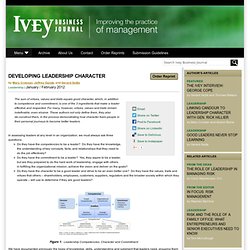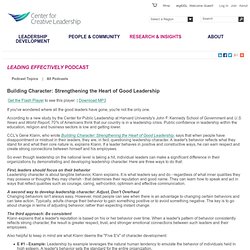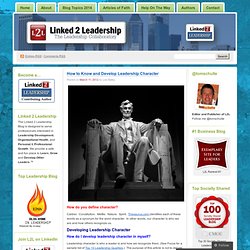

Servant Leadership. Leadership Maturity Model® Leadership character: A six-part series by West Point’s Col. Eric Kail - Guest Insights. Posted at 04:34 PM ET, 06/10/2011 Jun 10, 2011 08:34 PM EDT TheWashingtonPost By Col.

Eric Kail This piece is the introduction to a six-part series on leadership character. Picture the faces of the two most influential people in your life, the leaders who had the greatest impact on you. Now think back to the last time a senior leader cost your organization valuable assets, from stock value to human capital. While most leadership discussions center on what leaders do, this short series is intended to generate a dialogue on leadership character. The following six blog installments will roll out over the course of 2011 and will each focus on the importance of a particular facet of leadership character: courage, integrity, selflessness, empathy, collaboration and reflection.
In the first installment, on courage, I’ll examine both the moral and physical elements of the trait. Fourth, I’ll provide some thoughts on why we think we are so much more empathetic than we really are. Fortune Management & Career Blog. If a company is going to be great, its values have to go way beyond just a catchy slogan. By Jack and Suzy Welch, contributors FORTUNE -- It has been weeks now since Greg Smith's blistering public resignation from Goldman Sachs (GS). But based on Wall Street's reaction -- that Smith was a disgruntled rogue, and that it could have happened to any one of us -- it seems that perhaps the case's most important lesson is being missed.
And it happens to be one of the most immutable rules of business. In fact, soft culture matters as much as hard numbers. An organization's culture is not about words at all. First, for employees with good numbers and good values -- onward and upward. As for employees with good values but mediocre numbers -- the stance should be, we'll give you another chance with more coaching. Importance of a Clear Leadership Philosophy. Consistent leadership action and behaviour requires a clear leadership philosophy. Why? Well, because your leadership philosophy determines how you respond to people and how you respond to situations.
Developing Leadership Character. The sum of virtues, values and traits equals good character, which, in addition to competence and commitment, is one of the 3 ingredients that make a leader effective and respected.

For many, however, virtues, values and traits remain indefinable, even elusive. These authors not only define them, they also de-construct them, in the process demonstrating how character fuels people in their personal journeys to become better leaders. CCL Podcasts. If you've wondered where all the good leaders have gone, you're not the only one.

According to a new study by the Center for Public Leadership at Harvard University's John F. Kennedy School of Government and U.S. News and World Report, 70% of Americans think that our country is in a leadership crisis. Public confidence in leadership within the education, religion and business sectors is low and getting lower. Building Character: Strengthening the Heart of Good Leadership. How to Know and Develop Leadership Character. How do you define character?

Caliber. Constitution. Mettle. Nature. Spirit. Developing Leadership Character How do I develop leadership character in myself? Leadership character is who a leader is and how we recognize them. Developing any type of character is process. It is this: Sow a thought, and you reap an act; Sow an act, and you reap a habit; Sow a habit, and you reap a character; Sow a character, and you reap a destiny.
The character traits of a leader develop through the same process: focus, action, and persistence. A person focuses on a topic then does it over and over again until they get it right then over and over until the right response is relexive – focus, action, and repetition. This process is reiterated in Gary Kasparov‘s How Life Imitates Chess. Whether the subject is chess, hockey, music, computer programming, or leadership character the process is the same.